
AmEx names insider Christophe Le Caillec as CFO after Campbell decides to retire
Credit card giant American Express Co said on Tuesday Chief Financial Officer Jeffrey Campbell has decided to retire
2023-06-27 20:21

Your Fourth of July Cookout will cost you less this year, according to American Farm Bureau
Good news for your Fourth of July cookout — it's more affordable than last year. Families can expect to pay $67.73 for a party of 10, down 3% from last year's record high, according to a survey from the American Farm Bureau Federation.
2023-06-27 17:18
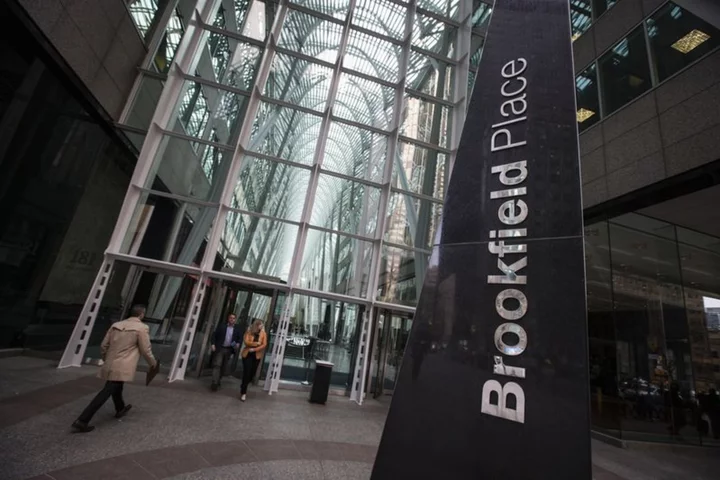
Brookfield's reinsurance arm nearing deal to buy American Equity - source
By Anirban Sen (Reuters) -Canadian private equity firm Brookfield's reinsurance arm is nearing a deal to buy insurer American Equity
2023-06-27 06:29
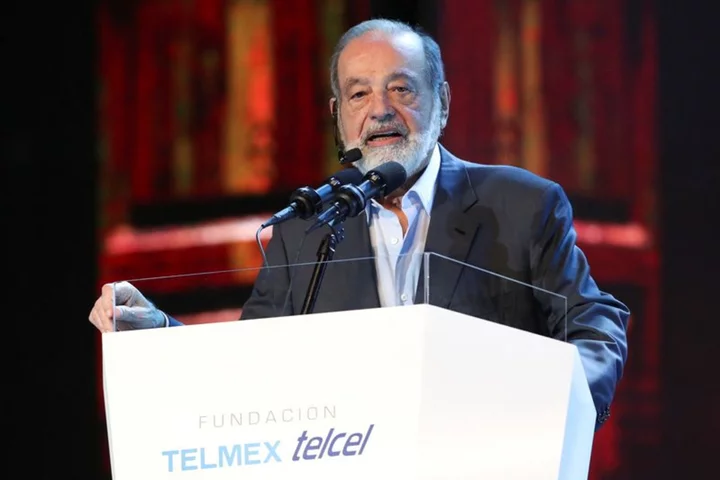
America Movil announces foreign debt offering of up to 20 billion pesos
MEXICO CITY Mexican telecommunications giant America Movil, controlled by the family of tycoon Carlos Slim, announced the launch
2023-06-26 22:50

Hoax bomb threats target major US retailers including Walmart and Whole Foods demanding bitcoin and gift cards
Law enforcement agencies are investigating a series of hoax bomb threats that targeted major US retailers and grocery stores in an apparent extortion scheme for thousands of dollars in gift cards, bitcoin and cash, according to a report. Kroger, Meijer, Walmart and Whole Foods are among the companies that have been targeted in several states, according toThe Wall Street Journal. Callers have threatened to detonate bombs if gift cards, bitcoin or other payments are not provided, the newspaper reported. The FBI is working with state and local law enforcement to identify the threats, which have so far been unfounded, WSJ reported. It is unclear whether the calls are part of an organised effort. Callers have used block numbers to conceal their identities, according to police. One call to a Whole Foods in suburban Chicago reportedly demanded $5,000 in bitcoin and threatened to detonate a pipe bomb. Another call to a Kroger in New Mexico reportedly demanded an employee wire money and threatened that a bomb would go off if they called the police. Calls to a Meijer grocery store in Wisconsin demanded $5,000 in Apple gift cards. The threats echo similar menacing calls that have been a mainstay of local news outlets across the US in the past several years. After such threats, law enforcement agencies are typically called to the scene to evacuate the stores, causing major headaches for retailers and surrounding traffic. The latest efforts are “another evolving scam” for US retailers, according to Lisa Bruno, a senior executive vice president of retail operations at the Retail Industry Leaders Association, speaking to The Wall Street Journal. The threats also appear to be separate from those made towards retailers like Target, where stores in at least five states have faced threats over the company’s support for LGBT+ shoppers during Pride Month. Read More Pride collection backlash has derailed retailers, but LGBT designers are more empowered than ever Starbucks workers at 150 stores to strike over alleged ban on Pride decor
2023-06-26 01:46

Sierra Leone gears up for presidential election amid economic crisis, looming protests
With mounting frustration due to an ailing economy, rising unemployment and looming deadly protests, Sierra Leoneans are heading to the polls on Saturday, June 24, to select their next president. Thirteen people are vying for the top job in the west African country. But experts say it's likely to be a two-horse race between incumbent President Julius Maada Bio — elected in 2018 and fighting for his second term — and Samura Kamara, the head of the All People's Congress Party, Sierra Leon's main opposition camp. The winner needs 55% of the vote to clinch victory in the first round or it goes into a runoff within two weeks. More than three million people are registered to vote in the coming week. This would mark the country's fifth presidential election since the end of a brutal 11-year civil war — more than two decades ago — which left tens of thousands dead and destroyed the country's economy. Sierra Leone had witnessed two peaceful transfers of power since, from the ruling party to the opposition party. Bio has been facing increasing criticism because of debilitating economic conditions. Nearly 60% of Sierra Leone’s population of more than seven million are facing poverty, with youth unemployment being one of the highest in West Africa. Multiple deadly anti-government protests rocked the country, with calls for Bio to step down. Fueled by a rise in cost of living, the latest one in August, left dozens dead, including security forces. As of April, Sierra Leone, which has one of the world's weakest currencies, saw inflation rise to more than 43% — from a high of more than 41% in March — and the exchange rate against the U.S. Dollar is under pressure, according to economic analysts. The election also comes during a surge of regional political upheaval, with deadly clashes between supporters of the opposition leader, Ousmane Sonko, and police in Senegal as well as military coups in Burkina Faso and Mali. Thus, Sierra Leone having a peaceful vote is of greater importance, say analysts. “We’ve seen this democratic backsliding in the region. So if Sierra Leone's (presidential) election is free, fair and credible, it could be a bellwether for regional democracy,” said Jamie Hitchen, a political analyst focused on Sierra Leone and an honorary research fellow at the University of Birmingham. This week's vote is expected to be a tight race. It will be a reverse of the 2018 presidential elections when Bio — at the time representing the opposition party — faced Kamara from the then-ruling party, whom the former president had handpicked as his successor. Bio, at the time, narrowly beat Kamara in a runoff by a margin of less than 5%, mainly because of support in the southern and eastern districts. Kamara garnered support from the north and west regions. A former military head of state, Bio came to power promising to end rampant corruption. Analysts say that he had invested in improving education in the country and took steps to fight rampant corruption. The country ranked 110 on Transparency International's index in 2022, moving up from 129 when he took office. But the weak economy has drawn criticism, with Sierra Leoneans taking to the streets protesting widespread poverty. Bio coined his current presidential campaign, “The People's Manifesto 2023,” promising to “solidify gains” made during his tenure. “Despite the turbulent times globally, we have done the work in the past five years,” he said at his campaign launch in May, assuring his supporters of a “victory in the polls, with God on our side.” Bio's opponent, Kamara, a seasoned politician who served in various government positions including as foreign minister, is running while facing corruption charges, since 2021, of allegedly embezzling public funds from a renovation project in New York during his time as minister. His case is set to be heard in court by mid-July. He's hoping to catapult support by promising to fix the country’s economic woes. Regardless of who wins the election, economic growth is expected to remain slow, bogged down by sluggish global expansion and a rise in domestic inflation, said Rukmini Sanyal, an analyst for the Economist Intelligence Unit, a research and analysis division of the Economist Group. The new government will face the same macroeconomic challenges and so “the risk of social unrest” will continue over the near-term, Sanyal said. Public frustration over soaring inflation, widespread poverty and high unemployment rate "will play a key role in eroding away the incumbent (party's) popularity,” she said. Still, locals say prices have spiked so much, that another term of the current president isn't comforting. “We need someone who can manage the economy because clearly (the president) is unable to, and we are suffering,” said Alpha Kamara, a taxi driver in the capital, Freetown. Some people, however, say the ruling party has a proven track record and they are willing to give it more time. “I want to see more development, which is why I am going to vote for Bio," said Mohamed Lamin, a local, “he provided us with free education, built roads, a new airport and many other (projects).” Rights groups warn that economic troubles are compounding distrust in a population already skeptical of government institutions and that neither party has so far presented “a meaningful path forward.” “One of the biggest fears of (the population) is the fear of crisis. We live in a society where we have a huge level of distrust among ourselves,” said Abdul Fatoma, chief executive for Campaign For Human Rights Development International, a local advocacy group. “The opposition and the ruling party are not giving us a clear roadmap as to how we are going to revamp the economy," he said, "How are we going to build trust in investors (and) businesspeople?” But for many Sierra Leonians, once the votes are cast on June 24, what they'll be watching for is a president who can bring people together. “Within their first 100 days, (the winner) should try not to vilify their opponents, nor create a hostile environment where people start feeling left out,” said Thomas Moore Conteh, the executive director for the Citizens Advocacy Network, a local rights group. “What we expect is (a president who) unifies the country, and works on building a powerful economy." ———- Mednick reported from Dakar, Senegal Read More Ukraine war’s heaviest fight rages in east - follow live Charity boss speaks out over ‘traumatic’ encounter with royal aide EU member Slovenia overwhelmingly defeats Moscow ally Belarus for a seat on the UN Security Council Blinken arrives in Beijing for first China visit by US’s top diplomat in five years Trump floats special counsel conspiracy as he claims Fox abandoned ‘King’ of Maga
2023-06-18 15:59
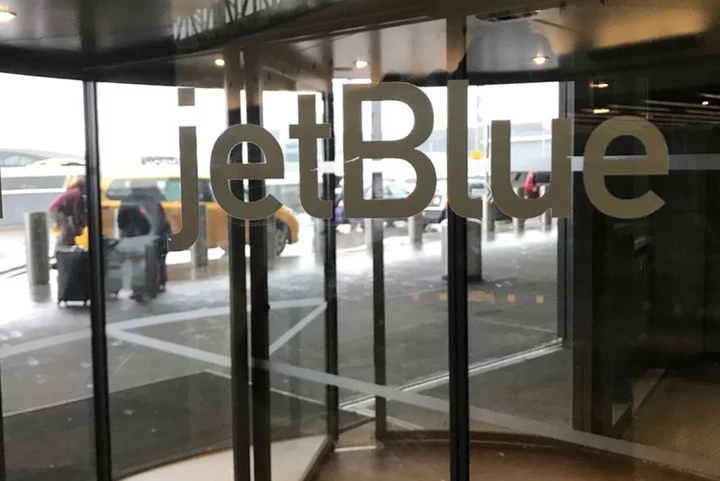
US judge delays American Airlines, JetBlue injunction date
WASHINGTON U.S. District Judge Leo Sorokin on Monday delayed the effective date of a permanent injunction after ruling
2023-06-13 01:51

American, JetBlue urge US judge to allow them to keep codeshare arrangements
By David Shepardson WASHINGTON American Airlines and JetBlue Airways asked a U.S. judge late Friday to allow them
2023-06-10 08:29

Ex-CEOs at Brazil's Americanas did not make proper accounting disclosures - regulator
SAO PAULO Brazil's securities regulator has accused two former CEOs of retailer Americanas with failing to comply with
2023-06-06 06:25
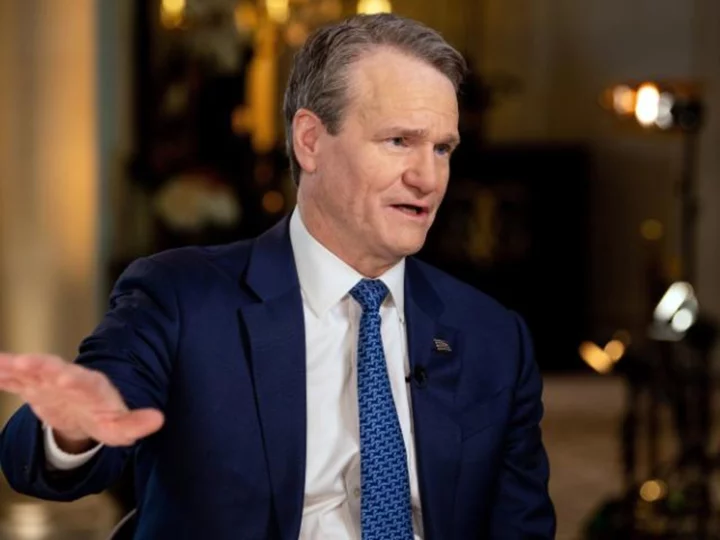
Bank of America CEO says the Fed's biggest challenge is power of US consumer
Bank of America CEO Brian Moynihan said although he is relieved lawmakers reached a resolution for the debt ceiling, it is "not good for the United States to go through this."
2023-06-05 00:58
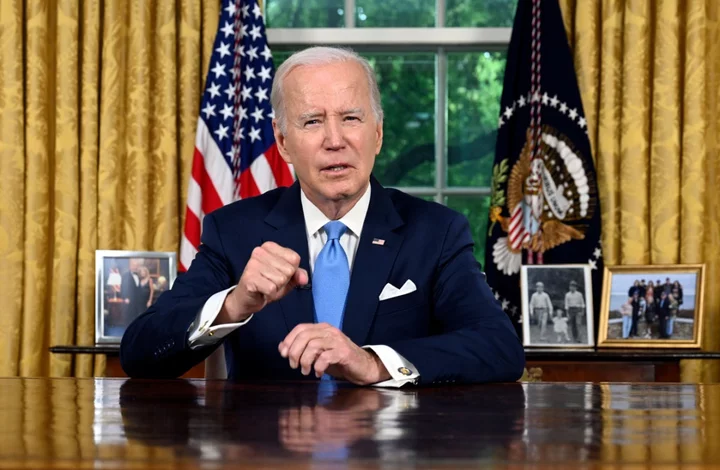
Biden expected to sign budget deal to raise debt ceiling
President Joe Biden is expected to sign legislation on Saturday to raise the debt ceiling, just two days before the U.S. Treasury warned that the country would struggle to pay its bills. The bipartisan measure, which was approved this week by the House and Senate, eliminates the potential for an unprecedented government default. “Passing this budget agreement was critical. The stakes could not have been higher," Biden said from the Oval Office on Friday evening. “Nothing would have been more catastrophic,” he said, than defaulting on the country's debt. The agreement was hashed out by Biden and House Speaker Kevin McCarthy, giving Republicans some of their demanded federal spending cuts but holding the line on major Democratic priorities. It raises the debt limit until 2025 — after the 2024 presidential election — and gives legislators budget targets for the next two years in hopes of assuring fiscal stability as the political season heats up. “No one got everything they wanted but the American people got what they needed,” Biden said, highlighting the “compromise and consensus” in the deal. “We averted an economic crisis and an economic collapse.” Biden used the opportunity to itemize the achievements of his first term as he runs for reelection, including support for high-tech manufacturing, infrastructure investments and financial incentives for fighting climate change. He also highlighted ways he blunted Republican efforts to roll back his agenda and achieve deeper cuts. “We’re cutting spending and bringing deficits down at the same time,” Biden said. “We're protecting important priorities from Social Security to Medicare to Medicaid to veterans to our transformational investments in infrastructure and clean energy.” Even as he pledged to continue working with Republicans, Biden also drew contrasts with the opposing party, particularly when it comes to raising taxes on the wealthy, something the Democratic president has sought. It’s something he suggested may need to wait until a second term. “I’m going to be coming back,” he said. “With your help, I’m going to win.” Biden's remarks were the most detailed comments from the Democratic president on the compromise he and his staff negotiated. He largely remained quiet publicly during the high-stakes talks, a decision that frustrated some members of his party but was intended to give space for both sides to reach a deal and for lawmakers to vote it to his desk. Biden praised McCarthy and his negotiators for operating in good faith, and all congressional leaders for ensuring swift passage of the legislation. “They acted responsibly, and put the good of the country ahead of politics,” he said. Overall, the 99-page bill restricts spending for the next two years and changes some policies, including imposing new work requirements for older Americans receiving food aid and greenlighting an Appalachian natural gas pipeline that many Democrats oppose. Some environmental rules were modified to help streamline approvals for infrastructure and energy projects — a move long sought by moderates in Congress. The Congressional Budget Office estimates it could actually expand total eligibility for federal food assistance, with the elimination of work requirements for veterans, homeless people and young people leaving foster care. The legislation also bolsters funds for defense and veterans, cuts back some new money for the Internal Revenue Service and rejects Biden’s call to roll back Trump-era tax breaks on corporations and the wealthy to help cover the nation’s deficits. But the White House said the IRS' plans to step up enforcement of tax laws for high-income earners and corporations would continue. The agreement imposes an automatic overall 1% cut to spending programs if Congress fails to approve its annual spending bills — a measure designed to pressure lawmakers of both parties to reach consensus before the end of the fiscal year in September. In both chambers, more Democrats backed the legislation than Republicans, but both parties were critical to its passage. In the Senate the tally was 63-36 including 46 Democrats and independents and 17 Republicans in favor, 31 Republicans along with four Democrats and one independent who caucuses with the Democrats opposed. The vote in the House was 314-117. ___ AP Congressional Correspondent Lisa Mascaro contributed to this report. Read More Ukraine war’s heaviest fight rages in east - follow live Charity boss speaks out over ‘traumatic’ encounter with royal aide FBI offers to show GOP chairman document that purports to relate to Biden, his family Republicans schedule 1st presidential debate for Aug. 23, but there's no guarantee Trump will attend DeSantis wraps up 1st early states tour as candidate with more personal touch in South Carolina
2023-06-03 12:19
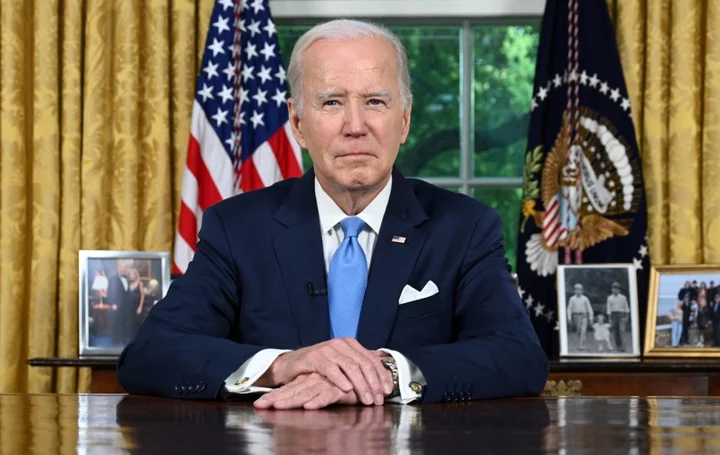
Biden calls for national unity as he hails debt limit agreement in Oval Office address
President Joe Biden on Friday urged Americans not to give up on working across the political aisle to solve national problems as he hailed the bipartisan legislation passed by Congress to stave off a catastrophic default on the nation’s sovereign debt as a good compromise that will protect the economic progress of the past two years. Speaking from the Oval Office during the prime-time television viewing hours — the first time he has addressed the nation from behind the iconic desk hewed from timbers taken from HMS Resolute — Mr Biden said he’d chosen to speak to the American people that night to “report on a crisis averted” and explain what his administration and Congress “are doing to protect America’s future” by enacting the spending agreement negotiated between his aides and top House Republicans. The president said he would sign the legislation on Saturday. “Passing this budget agreement was critical. The stakes could not have been higher,” he said, just moments after he told Americans that the goals of the agreement — “keeping the full, faith, and credit of the United States” and enacting “a budget that continues to grow our economy and reflects our values as a nation” – are “essential” to continuing the progress made during the first two years of his presidency. The president said “nothing” would have been more irresponsible or catastrophic than a failure by the US to pay its bills and laid out the dire consequences that a default would’ve brought on Americans of all stripes. “Our economy would have been thrown in recession. Retirement accounts for millions of Americans would have been decimated, eight million Americans would have lost their jobs. Default would have destroyed our nation’s credit rating, which would have made everything from mortgages to car loans to funding for the government much more expensive and it would have taken years to climb out of that hole — and America standing as the most trusted, reliable financial partner in the world would have been shattered,” he said. While Mr Biden said it was “critical” to reach the agreement he will sign into law and called it “good news for the American people,” he also stressed the necessity of compromise given the realities of Republican control of the House of Representatives and the thin one-seat majority by which his own party controls the Senate, as well as the importance of provisions in the bill that will ensure key social programmes will receive full funding in the next two years. “No one got everything they wanted but the American people got what they needed. We averted an economic crisis and an economic collapse,” he said. “We’re cutting spending and bringing deficits down. And, we protected important priorities from Social Security to Medicare to Medicaid to veterans to our transformational investments in infrastructure and clean energy.” He also touted the fact that the agreement preserved legislation like the PACT Act– which extends veteran benefits to service members who suffered health complications from burn pits – and the Inflation Reduction Act, as well as the CHIPS and Science Act, which promotes manufacturing of semiconductors in the United States. “Remember at the beginning of this debate, some of my Republican colleagues are determined to get the clean energy investments,” he said. “I said no, we kept them all.” Mr Biden’s remarks came less than 24 hours after the Senate approved the compromise bill by a margin of 63-36, and just over two days after the House of Representatives voted to advance the legislation. They represent the most extensive public comments the president has made on the now-resolved crisis after weeks of silence from the White House. Many in the president’s own party had criticised his reluctance to inject himself into the public discourse surrounding the negotiations. But a source close to the White House end of the process told The Independent on Thursday that Mr Biden’s silence was a deliberate choice, made out of necessity to avoid inflaming Republicans who would need to vote for the legislation to avert what most experts say would have been a worldwide economic disaster brought on by a US debt default. In the end, Mr Biden’s strategy proved successful in preventing Republican opposition from sinking the 11th-hour deal to save the US and world economies, and the White House was able to cajole all but a limited number of Democrats to give their support as well. Of the 51 members of the Senate Democratic caucus, just five joined 31 Republicans in opposition to the measure, which will suspend the nation’s statutory debt limit through the entirety of the 2024 election cycle while implementing limited spending cuts sought by the GOP and enacting some work requirements for non-disabled adults without children between the ages of 50 and 54 to access the Supplemental Nutrition Assistance Program, otherwise known as SNAP and formerly known as food stamps. A number of arch-conservatives in the House of Representatives had criticised the bill as giving away far too much to the White House, and in the end 71 members of the GOP conference voted against it, necessitating Democrats to contribute enough support to pass the GOP-controlled chamber. The bipartisan legislation, which was unveiled earlier this week following marathon negotiations between the White House and the Republican-led House of Representatives, will be signed into law with just two days remaining before the 5 June “X Date,” the day on which Treasury Secretary Janet Yellen had projected that the government would exhaust its ability to pay its outstanding debt obligations absent intervention from Congress. The spending and debt ceiling deal is the first major bipartisan agreement between the White House and the House since Mr McCarthy was elected Speaker after a record 15 ballots in January. The president had for months pledged not to negotiate while the GOP held out the possibility of a default as leverage to force him to endorse rolling back much of the legislative accomplishments enacted during his first two years in office, while Mr McCarthy had committed not to allow any bill that would lift the debt limit to move through his chamber absent concessions from the White House. The impasse persisted for months until Mr Biden extended an invitation to Mr McCarthy after the House passed what the GOP dubbed the “Limit, Save, Grow Act” — a bill to lift the debt ceiling and enact massive cuts to government programmes. Negotiations kicked into high gear late last month after the president tapped Shalanda Young, the director of the Office of Management and Budget, and Counsellor to the President Steve Ricchetti — one of his longest-serving and most trusted aides — to engage with two GOP House members chosen by Mr McCarthy, House Financial Services Committee Chair Patrick McHenry and Louisiana Representative Garret Graves. The president praised House Speaker Kevin McCarthy, as well as Senate Majority Leader Chuck Schumer, Senate Minority Leader Mitch McConnell and House Minority Leader Hakeem Jeffries for undertaking good-faith efforts to move the bill through their respective chambers with deliberate speed. “They acted responsibly and put the good of the country ahead of politics,” he said. “A final vote in both chambers was overwhelming.” He closed his address by emphasizing unity and the importance of “see[ing] each other’s not as adversaries but as fellow Americans” and “treat[ing] each other with dignity and respect” as a way to “lower the temperature” so both parties can “work together ... to pursue progress, secure prosperity and keep the promise of America for everybody”. “I know bipartisanship is hard, and unity is hard, but we can never stop trying because in moments like this one, the ones we just faced, where the American economy in the world economy is at risk of collapsing,” he said. “There’s no other way. With reporting from Andrew Feinberg in New Hampshire and from Eric Garcia in Washington Read More Senate passes debt limit bill after marathon 11 amendment votes to avoid default Angry progressives and conservatives hit out as Democrats push through Biden-McCarthy debt ceiling deal FBI offers to show GOP chairman document that purports to relate to Biden, his family Republicans schedule 1st presidential debate for Aug. 23, but there's no guarantee Trump will attend DeSantis wraps up 1st early states tour as candidate with more personal touch in South Carolina
2023-06-03 07:58
